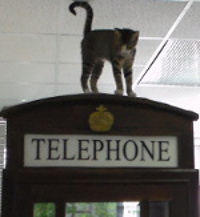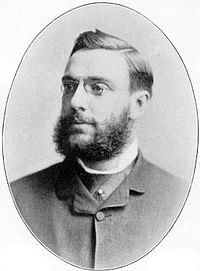Wild cats are prowling all over telecommunications...

It's a jungle out there. We've spotted wild cats prowling over telecom. You must
be on the look-out for hackers, scammers, and thieves. This newsletter is full of
ideas for your protection, information and amusement.
I know the metaphor is a stretch, but isn't this a cute picture of Beau Boy Kitty!
Digital, VoIP, Hosted / Cloud-Based, Converged...

Which telecom technology is best for your business?
When it comes to telecommunications today, you've probably heard these techie terms
and many more. We know it can be very confusing.
Some tech companies make it sound like only one of these technologies is the ideal
solution for every business. (Could it be that's the only solution they have to
offer???)
We're not saying which technology would be right for your business, or maybe which
combination would work best for you. We just don't know without asking questions
and gathering information about your company. Without doing that "due diligence"
it would be like the Doctor writing a prescription before knowing what symptoms
you're experiencing. That could be considered malpractice.
Doesn't it make sense to get the whole story from a company that offers and supports
all of these technologies instead of just one?
This summer Toshiba added the hosted / cloud-based VIPedge to their line up of products
including the IPedge VoIP systems and Strata CIX Digital / Converged systems.
See the
VIPedge Brochure here.
How to create secure passwords...

We all know we need to change any password from the default. Plus, we're supposed
to change passwords periodically and make sure they are good ones that hackers can't
crack. But how do you come up with a good password?
First, some things you shouldn't do...
- Don't use a single word, even if you spell it backwards
- Don't use a birthday, anniversary, passport number, etc.
- Don't use a person's name – especially your own
- Don't use sequential numbers or letters, even if they're going backwards
- Don't use repeated numbers or letters
- Don't use adjacent numbers on the keyboard like UIOP
Things you can do to improve the safety of your passwords...
- Set reminders for yourself to change passwords on a regular basis (maybe every 3
months)
- Use a different password for every account
- Make passwords at least eight characters in length
- Use a variety of characters including numbers, letters, punctuation and symbols
for greater complexity
- Microsoft recommends using this formula: start with a sentence, remove the spaces,
shorten or misspell words and add numbers that mean something to you.
Now that you know how to create good passwords, the next problem is how to keep
them straight. How will I ever remember so many passwords? Are password management
softwares safe to use? Should I use an on-line password checker to see how good
it is? Too many passwords and too many questions...but that's another article for
another day.
Sources: http://www.microsoft.com/security/online-privacy/passwords-create.aspx,
http://www.washingtonpost.com/blogs/on-small-business/post/an-online-password-guide-for-small-business-owners/2012/07/10/gJQAVevbbW_blog.html
Can you answer this riddle?

What do you own that contains precious metals valued up to $9,500 per ounce, thieves
can easily steal it in 2 minutes or less, and theft of these valuable devices happens
in Overland Park, Independence, throughout the Kansas City area and across the nation?
Give up? It's the catalytic converter on your car, truck or van and the vehicles
in your company's fleet. Thieves are stealing them even in broad daylight and we
thought you should know how to protect against it.
One COMMWORLD customer located on a well-traveled section of Ward
Parkway (obviously in a nice part of town) had catalytic converters stolen off of
3 vehicles in their parking lot in broad daylight. Before we beefed up our Video
Surveillance system, the converters on a COMMWORLD van and a car
were stolen in our parking lot.
It can happen anywhere - at shopping malls, commercial building parking lots or
your driveway at home. It's a simple process that only requires a couple of minutes
or less. It they're careful, the thieves won't do additional damage to the vehicle,
but that isn't always the case. You'll know it has happened when you start your
vehicle and instead of hearing its normal sound, you'll hear a sound closer to the
roar of a Harley.
Here are 7 Ways Video Surveillance can help your business...
Typically the thieves sell the stolen catalytic converters to scrap yards for prices
ranging from $45 to $150. But the real money comes from the extraction of the platinum,
palladium, rhodium or gold contained in the converters. Platinum, which is more
valuable than gold, sells for about $2,000 an ounce and rhodium sells for roughly
$9,500 an ounce.
What can you do to protect yourself and your company? Here are 10 steps to consider...
10 Ways to Protect Yourself & Your Company from Catalytic Converter Theft
- Building owners should make sure parking lots have adequate lighting. Always park
in well-lit areas.
- Park near entrances or other busy areas where your vehicle is visible to passers
by.
- If you own a building, consider fencing the parking area.
- Engrave the license plate number on the converter to make it traceable.
- Install a vehicle security system set to trigger with the slightest motion.
- Weld the converter to the vehicle's frame.
- Install a catalytic converter theft deterrent system.
- Park your vehicle inside a garage when possible. If you must park outside at home,
install a motion-sensor light over the space where you park.
- Check your auto insurance to determine the coverage for catalytic converter theft.
- nstall a high-quality video surveillance system to protect your business, people
and vehicles. (Call COMMWORLD to learn about Toshiba's Video Surveillance
Systems)
Source: The blog of Overland Park Police Chief, John Douglass http://oppdchief.blogspot.com/2012/09/catalytic-converter-thefts-on-rise-again.html
WHO'S IN YOUR MASTERMIND GROUP?

"It's not easy to be successful in any endeavors today, especially in business".
That statement has been true for eons, however, it may be just a little more true
today given the challenging economic and political times nationally and worldwide.
I believe we all recognize that we need help from people we can trust.
When anybody is challenged at learning a process or talent then it is probably a
good idea to get help from an expert in the field in which they desire to excel.
Wouldn't it be wonderful to have a "Master" or "Group of Masters" to help you with
whatever you wished to learn, to guide you with your thoughts and actions – to be
at your beck and call?
Well, why not set up your own "Mastermind Group".
If you Google Mastermind Groups, you will have 10,000,000 choices from which to
choose. That means that there are either a lot of "Masters" to help you set up a
mastermind group or there are just a lot of "Masters" out there. Either way, if
there are that many "Masters" available to help, the world's economy should be improving
soon? Are the "Masters" truly "Masters"? Maybe they are. Only history will tell.
I don't remember what source I read it in, but it stated we can set up our own "Mastermind
Group" simply by choosing people from history, that we have the greatest confidence
and trust in, to be our Mentors. Sometimes it takes decades and even centuries before
individuals are truly recognized as "Masters". It may be better just to develop
your Mastermind Group using historical figures that have been recognized as true
Masters. People like Einstein, Twain, Gandhi, Socrates, Edison, Franklin, Cayce,
Russell etc.
When you have a decision, question or choice to make about anything, quiet your
mind and conjure up a conversation with one or more of your Mastermind Group. Just
use your imagination, a gift that Einstein considered to be even more important
than knowledge, and intentionally receive the help they offer.
One of my choices as a "Master" is Walter Russell. Walter Bowman Russell (May 19,
1871 – May 19, 1963) was an American polymath born in Boston, Massachusetts. He
believed that anyone could achieve anything they desired and everyone was endowed
with genius from birth. If they did not succeed at what they chose, it was because
they chose to not succeed.
At the age of seven, Russell had an epiphany that expanded his consciousness to
the point that he found it impossible to continue participation in organized education.
So, at the age of nine, he dropped out of school to work. He felt there was no need
to go to school if he could elicit whatever he wanted to know from the ether. Every
year in May, Walter would experience times of ethereal education and every seven
years throughout his life he experienced even more extended and intense periods
of enlightenment - the longest, in 1921, lasted for thirty-nine days. From these
experiences, his imagination allowed him to develop a cosmogony that was decades
if not centuries ahead of its time.
There were times when his family and acquaintances had him evaluated for commitment
to an asylum, however, the doctors would all agree that what he was saying and writing
was so brilliant that it was often beyond the comprehension of the average person.
One subject in which Russell was a fierce believer was that anyone could accomplish
what he had accomplished if they intentionally decided to, and then just did it.
He felt that too many people chose to be mediocre over being exceptional. His goal
was to help at least ten people learn to develop their utmost potential and then
they would each help ten more and those help ten more each. The result would infuse
humanity with the desire to change the world from one of greed and war to one of
peace and love.
His accomplishments are legendary. Before he was walking he was able to play any
song one note at a time that he heard. A blind neighbor befriended him as a child
and helped him with his musical aspirations, so at the age of 13, Walter became
the organist for his church.
When he turned 46, Walter competed in figure skating and became a world champion.
If you see a picture of Walter Russell you will recognize that he did not appear
to have the physiology of a world class skater. He also became known as a world
class scientist, author, poet, artist, sculptor and more.
He developed a periodic table that included elements not yet discovered by scientists.
About ten to fifteen years after this table was released, three of his unknown elements
were discovered that led to the development of the atomic bomb.
He had two students that took his ideas, passed them off as their own and won Nobel
Prizes. When asked about that, he replied that he was pleased that his teachings
were used to benefit humanity.
Walter Russell was a visionary who teamed with Thomas J. Watson in the 1930s to
write the book THINK, a series of lectures Russell made to IBM executives and employees.
It comprised a new concept of ethical business practice using balanced thinking,
universal principles, and actions based on character. It is just as applicable today
as it was when written over 80 years ago.
These are just a few of the exceptional achievements of a man that never experienced
formal education. A man who became whatever he wanted to become simply because he
believed he could. That is the kind of person from whom I wish to learn. That is
the kind of person I want as a mentor and "Master".
Who is in your "Mastermind Group"?
...Robert E. Bennett, COMMWORLD of Kansas City CEO & Founder
25 Under 25 Nominations are Due October 10th...

Don't miss this opportunity to shine!
Why not nominate yourself? You know your business better than anyone on the outside.
If you're doing well, why not share the good news as inspiration to others!
Nominees must operate a for-profit business that is at least 3 years old with fewer
than 25 employees and which is located in the Greater Kansas City area. Go to www.ithinkbigger.com
to get all the details.
The culminating "25 Under 25 Gala" which will be next February is THE small business
event of the year. Kelly Scanlon and her team at Thinking Bigger Business Media
do a fabulous job of showcasing the winners and all small businesses in K.C.
COMMWORLD of Kansas City is still proud to be a "2005 25 Under
25 Honoree".
Fun Phone Facts...

Who was the mysterious Mr. Watson and what did he do?
On March 10, 1876, Alexander Graham Bell spoke the first words transmitted over
the earliest telephone, "Mr. Watson, come here. I want you!" We know a lot about
Bell, but what do you know about Mr. Watson who was on the other end of the line?
Thomas A. Watson was born in 1854 in Salem, Massachusetts. He dropped out of school
at age 14 and tried bookkeeping and carpentry before going to work in a machine
shop. It was there that he met Bell and helped build the harmonic telegraph, Bell's
precursor to the telephone. The harmonic telegraph was designed to send several
"dots and dashes" messages simultaneously.
Bell hired Watson to be his assistant. Jointly, the two men discovered that the
tones created by a vibrating reed could be transmitted through wire. This led to
that first telephone conversation between two rooms in a boarding house. Seven months
later on October 9, 1876 - Bell and Watson spoke over the telephones they had invented
while they were two miles apart.
Watson is credited with being the "manufacturer of the first telephone". He actually
built and installed those earliest phones. While Bell traveled to seek additional
funding, Watson stayed behind to work out design problems and oversee manufacturing
at the Bell Telephone Company. The royalties he earned made him independently wealthy
and after seven years, he became restless and left the company.
Watson was a Renaissance man. After he left Bell, he married and tried being a farmer,
but that didn't suit his personality. In the 1890's he wanted to end the unemployment
problem in Boston so he formed the Fore River Ship & Engine Company. The company
grew to 4,000 employees. They built the U.S. Navy's first two 400-ton torpedo ships
before being bought out by Bethlehem Steel in 1913.
He and his wife studied geology at MIT, and then he traveled to California and Alaska
to look for gold. He became a Shakespearean actor, even performing at Stratford-upon-Avon.
He wrote plays based on novels which were then performed by an acting company he
helped form. He became a lecturer on geology and the telephone and he performed
dramatic readings. He founded the Braintree Electric Light Company in Braintree,
Massachusetts. He served as President of a Society dedicated to the poetry of Robert
Browning.
In January 1915, Watson and Bell celebrated the completion of the first transcontinental
phone line by sharing another famous phone call. This one was from New York City
to San Francisco. In 1920 he spoke of telephone conversations spanning the Atlantic
Ocean as only being the beginning of how telecommunications would develop. In 1926,
he predicted that one day, "man will speak to man by mental telepathy."






